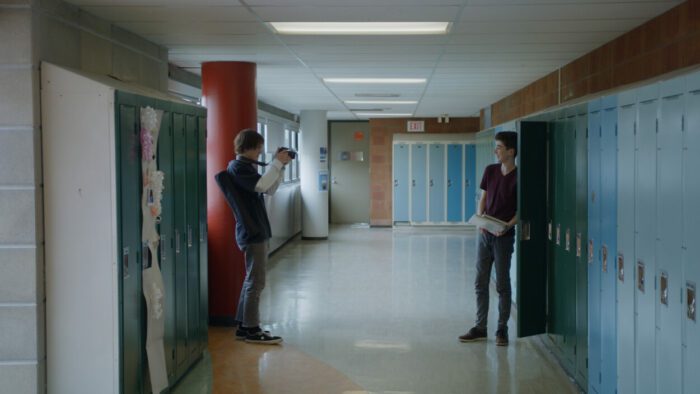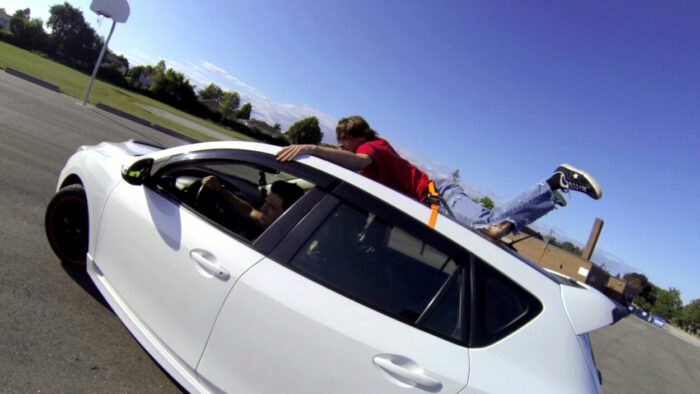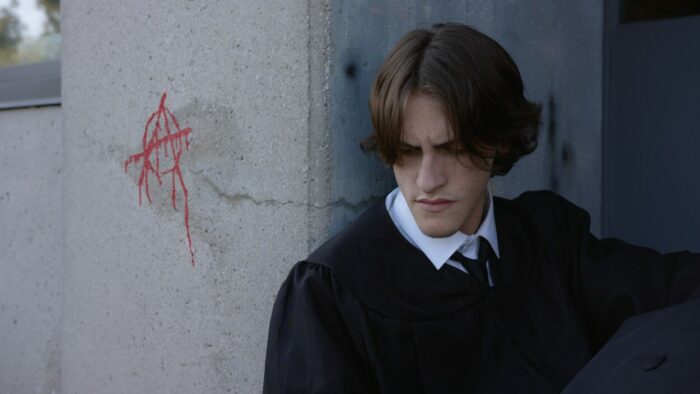“School sucks,” according to just about anyone who went through it, including Ethan Eng. At the time, Eng was a 17-year-old Cawthra Park Class of 2019 senior with some friends and a couple of cameras. His primary means of dealing with adolescent angst was to turn the lens on himself, his friends, and nearly every part of his high school experience. Eng blithely told anyone who asked he was on the yearbook staff: a bald-faced lie, but one apparently universally accepted. The result is his Therapy Dogs, a film that looks and feels like a video-journal documentary but ultimately deconstructs both that form’s cheap sentimentalism and the boundary between reality and fiction itself.

Eng—let me call him Ethan, here, as he’s a character in his own film—and his best friend Justin (Morrice, credited as co-writer) found high school for the most part a set of pat clichés, and so they set out to use their cameras to tell the truth. Or a truth, anyway. Very little of Therapy Dogs takes place in high school classrooms themselves: what happens there, we’re to assume, matters hardly at all. Instead, the scenes play out in the school hallways, in the cafeteria, outside the grounds, in the parking lots, around town, and at parties. Shot the year before Covid, there’s no plastic barriers, masks, or Zoom class. Just like they (okay, we) did nearly 50 years ago, the high school kids in Therapy Dogs are still smoking pot and rocking out to Queen.

That high school boys are prone to all kinds of jackassery is no surprise, but Therapy Dogs documents and characterizes all of their crazy stunts and testosterone spikes with panache. There’s a bloody, bareknuckled impromptu cage bout, Fight-Club style, between best friends Ethan and Justin in an empty shopping cart corral. There’s an improvised bowling game at school, where the ball is a student on a task chair with casters and the pins a pyramid of empty desks. There’s a shopping-cart jousting match. A locker-punching pissing contest. An extended scene in which Ethan and Justin zip-tie and mask a buddy in torture. And another that involves strapping Justin to the top of a friend’s subcompact for some totally illegal parking-lot GoPro drifting.

Fortunately, most of those violent and generally idiotic behaviors are directed at each other. There’s no sense, like in the recent Beautiful Beings or Rodeo, to name two films also exploring dangerous and violent activities, that theirs is a pathway to criminality. Divided into small segments exploring different stunts, events, or milestones, the film keeps these episodes self-contained, without any grander narrative other than the stultifying passing of time, the waiting out senior year until parole is granted and real life begins.
Some scenes are a little less stupidly violent. There’s a parade of groan-inducing promposals that subject their proposers to potential public shaming. A third friend, Kevin, is self-consciously exploring his own artistic impulses in the school band and theater, which is in the midst of rehearsals for their production of Our Town. The late-modernist metatheatrical artifices of Thornton Wilder’s 1938 play might offer a hint that Therapy Dogs is a little more than it seems on the surface, that it too is playing with boundaries and form.
There’s also an extended argument when one of the boys appears quite seriously hurt—not by fists or stunts but words. The argument hinges on a comment Ethan makes, clumsily and offhandedly, that it wouldn’t matter if he didn’t see Justin “for the rest of my f*ing life.” Justin takes offense, and Ethan tries, unsuccessfully, to explain himself. Anyone with a few years past high school knows, though, that there’s some truth in what Ethan says: that come graduation, some of those high school friends will be left forever in the past, and with no regrets.

Later, the stunts continue to escalate. It’s a wonder no one gets (seriously) hurt. Until someone does, at least apparently, and then all bets are off. You realize what you should have realized all along: that Eng’s not just living his life on camera, but making a film. And every documentary—which is what you are fairly certain you are watching—has its fictions. In this guise of a video journal through senior year, Therapy Dogs is much more than that, like Sansón & Me not exactly a pseudo-documentary but leaning a little in that direction, a hybrid film straddling forms between fiction and nonfiction, feature and documentary, the reel and the real, cleverly deconstructing a form we all thought we knew perfectly well.
While I can’t quite imagine viewers decades from now watching and rewatching Therapy Dogs, the film makes for an excellent companion to some classics of high-school ennui and disaffection like Rebel without a Cause, Frederick Wiseman’s High School, Fast Times at Ridgemont High, and Easy A. And it has some serious backing: filmmakers Matt Johnson and Matthew Miller (Operation Avalanche, The Drifters) are executive producers, and last year at Slamdance Film Festival, Therapy Dogs earned a major prize, a $25,000 AGBO Fellowship and mentorship from longtime Slamdance supporters and Avengers: Endgame directors Joe and Anthony Russo.
Therapy Dogs may be the first film from Ethan Eng, but I’m betting it won’t be the last.
Following its release in select theaters, Therapy Dogs, directed by Ethan Eng, is available On Demand March 17th, 2023.


